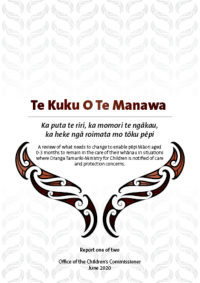The Children’s Commissioner is undertaking a review of Oranga Tamariki
Tamariki do best when they are cared for and nurtured by their whānau. For pēpi Māori, their connections to whakapapa and the importance of whanaungatanga affirm the importance of them remaining in the care of their whānau. This review recognises that ‘whānau’ extends further than immediate family and includes extended family members. Those we interviewed self-defined who was in their whānau.
The Children’s Commissioner has statutory responsibilities under the Children’s Commissioner’s Act 2003. These are wide ranging, and include: advocacy, research, and increasing public awareness, all in respect of the welfare and rights of children. The Children’s Commissioner also has separate responsibilities with respect to monitoring and assessing the policies and practices of Oranga Tamariki–Ministry for Children (referred to in this report as Oranga Tamariki). This report is a combination of both sets of responsibilities.
This report, Te Kuku O Te Manawa – Ka puta te riri, ka momori te ngākau, ka heke ngā roimata mo tōku pēpi, shares insights gained so far in this review which aim to answer the question:
What needs to change to enable pēpi Māori aged 0-3 months to remain in the care of their whānau in situations where Oranga Tamariki is notified of care and protection concerns?
After considering the multiple strands of evidence, we identified six areas for change to explore during stage two of this review. We started with themes drawn from our analysis of what we heard from mums and whānau and wove these together with other strands of evidence. These areas for change are:
Full report: https://www.occ.org.nz/publications/reports/te-kuku-o-te-manawa/




